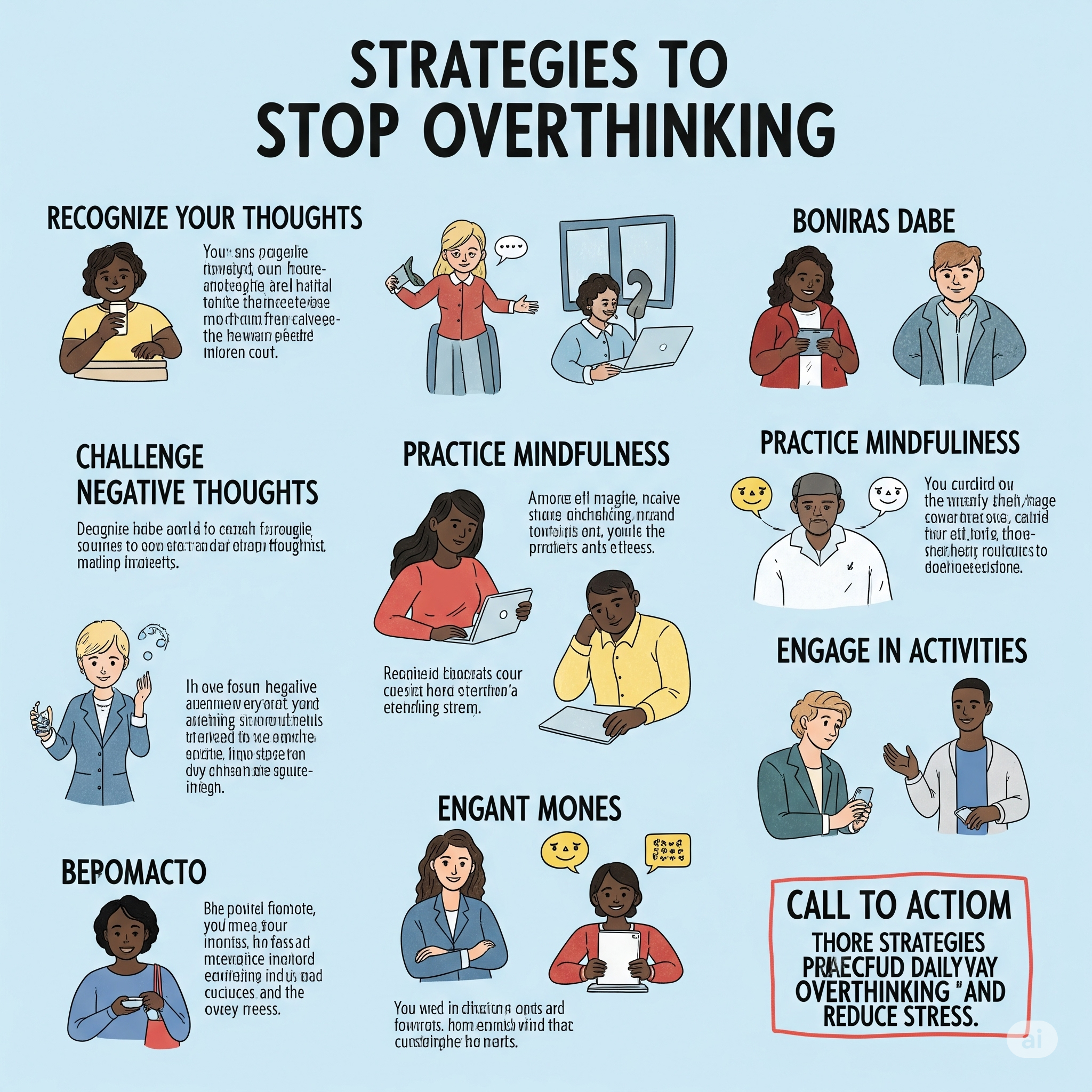
How to Stop Overthinking in Today’s World
How to stop overthinking is a question many of us are asking in today’s fast-moving, always-connected world. Our minds often struggle to keep up with constant demands , stress —whether it’s juggling work responsibilities, managing relationships, or endlessly scrolling through social media. As a result, it’s easy to feel overwhelmed stressed , and that’s when overthinking takes hold.

While some reflection is healthy, over-analysis, indecision, or excessive thinking about the future can hinder progress and impact mental well-being.Learning how to stop overthinking can help you regain clarity, reduce stress, and improve your quality of life.
If you’ve ever caught yourself thinking, “Why do I overthink everything?”, know that you’re not alone. In this guide, we’ll explore the causes of overthinking and offer practical techniques on how to stop overthinking quickly—so you can take back control of your thoughts and lead a more peaceful, productive life.
What is Overthinking?
Overthinking is the habit of analyzing, worrying, or dwelling on the same thought repeatedly without taking action. It often shows up as excessive self-criticism, fear of the future, or rehashing conversations in your head.
Actually, understanding what overthinking is the first step toward managing it
How to Stop Overthinking Signs of It
Recognizing the signs of overthinking can help you catch the cycle early. Some common signs include:
-
Replaying conversations or events in your mind
-
Second-guessing every decision
-
Constantly imagining worst-case scenarios
-
Feeling mentally exhausted without doing much
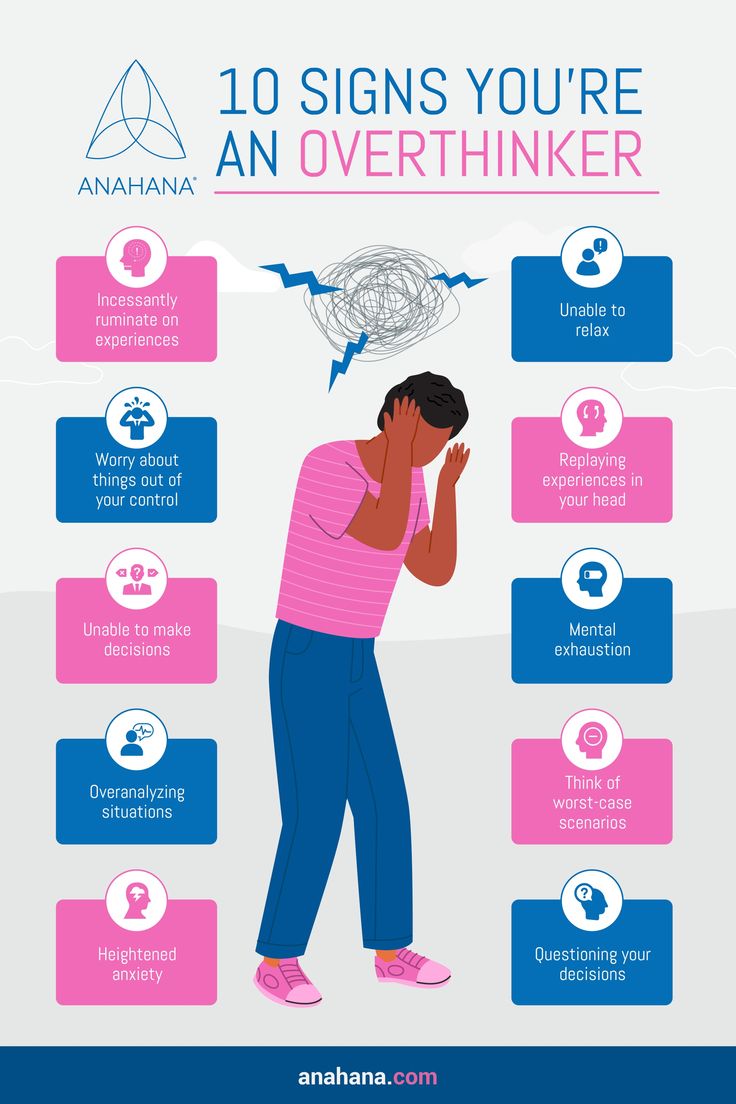
Causes of Overthinking and How to stop Overthinking
There are several causes of overthinking, including:
-
Fear of failure or making mistakes
-
Low self-esteem and lack of confidence
-
Past trauma or unresolved emotional experiences
-
Perfectionism and high expectations
-
Information overload in the digital age
Understanding these triggers can help you respond with more self-compassion and awareness.
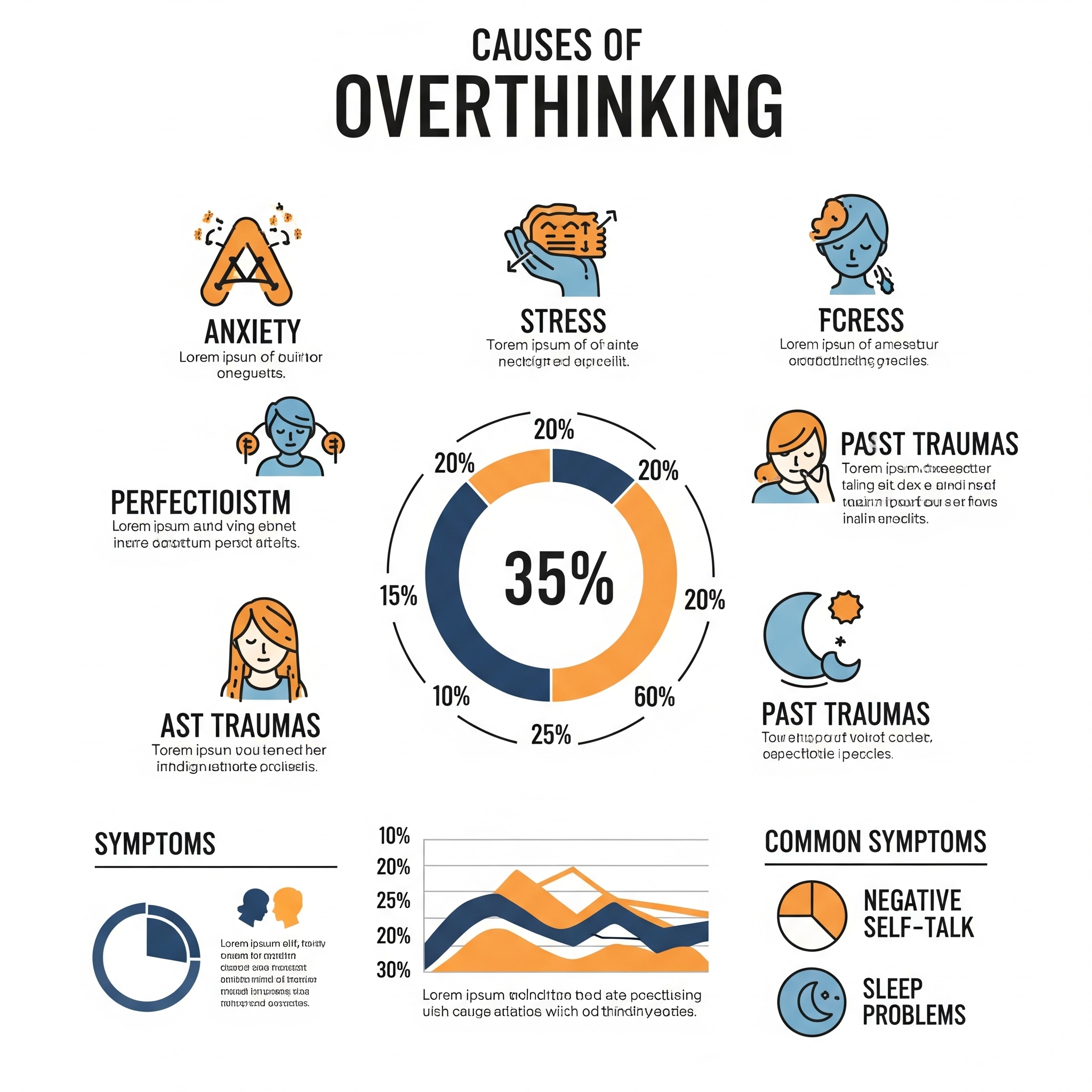
Overthinking vs. Worrying: Is There a Difference?
While both can feel similar, overthinking vs. worrying have subtle differences. Worrying usually focuses on future events and often involves emotions. however, can be more mental—analyzing the past, present, or future excessively.
Effects of Overthinking on Mental Health
The effects of overthinking extend beyond just feeling anxious. It can lead to:
-
Increased stress and anxiety
-
Reduced productivity
-
Low mood or depressive thoughts
-
Difficulty concentrating
How Overthinking Affects Mental Health
It can keep your nervous system in a constant fight-or-flight state, leading to long-term issues.
How to Stop Overthinking ? Break the Vicious Cycle
There’s a strong connection between overthinking and stress. The more you think, the more you stress, and the more you stress, the more you think—it becomes a loop that’s hard to break.
Impact of Overthinking on Sleep
A cluttered mind can make it hard to unwind at night. The impact of overthinking on sleep is one of the most immediate and obvious signs—difficulty falling asleep, restlessness, or waking up in the middle of the night.
Overthinking and Decision Making
Overthinking clouds your judgment, making even small decisions feel overwhelming. The more options you consider, the more paralyzed you may feel. Improving decision-making skills helps reduce this burden.
Practical Ways How to Stop Overthinking
Ready to take back control? Here are some practical ways to stop overthinking in your daily life.
1. How to Stop Overthinking suddenly
-
Count backwards from 100 to interrupt your thought loop
-
Take 5 deep breaths and focus only on your breathing
-
Say your thoughts aloud—sometimes hearing them can help dismiss them
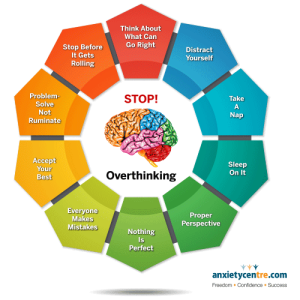
2. Tips to Control Overthinking
-
Limit your time on social media and news
-
Use journaling to release thoughts from your mind onto paper
-
Question your thoughts: Are they facts or fears?
3. Simple Tricks to Reduce Overthinking
-
Instead, set a 10-minute ‘worry window’ and only allow yourself to worry during that time.
-
Replace “what if” with “what is”
-
Keep a gratitude journal to shift focus from anxiety to appreciation
Managing Stress in a Busy Life (And How to Stop Overthinking)
In a fast-paced world, managing your mental state is essential. Here are effective stress relief tips and ways to calm your mind:
-
Break large tasks into smaller, manageable steps
-
Avoid multitasking; focus on one thing at a time
-
Schedule “do nothing” time to give your mind a break
How to Handle Stress Fast
-
Take a cold shower or splash water on your face
-
Step outside and take in your surroundings for 2–3 minutes
-
Use grounding techniques like the 5-4-3-2-1 method
Staying Calm in Busy Days
Staying calm doesn’t mean doing less—it means handling what you do more peacefully. Prioritize self-care and create boundaries with your time.
Building Mental Strength: How to Stop Overthinking
To reduce overthinking long-term, you need to develop mental resilience.
How to Stay Positive and how to stop overthinking
-
Surround yourself with optimistic people
-
Practice affirmations and positive self-talk
-
Shift your focus from problems to solutions.
Boost Confidence and Reduce Overthinking
Confidence comes with clarity. Set small goals, celebrate progress, and stop comparing yourself to others.
Developing Mental Toughness
-
Face challenge
-
Learn from failure
-
Keep promises you make to yourself
Improving Focus and Clarity
A cluttered mind leads to indecision and anxiety. Here’s how to clear your mind and improve focus:
-
Use the Pomodoro technique: work for 25 minutes, rest for 5
-
Remove distractions: turn off phone notifications
- Declutter your workspace
How to Clear Your Mind
-
Brain dump: Write down everything on your mind
-
Try meditating every day for just 5–10 minutes to calm your mind and build inner clarity
-
Go tech-free for an hour each day

Time Management and Productivity
Time pressure increases overthinking. Let’s work on managing time in a busy world more efficiently:
-
Plan your day routine the night before.
-
Use the Eisenhower Matrix to prioritize tasks easily
-
Break big decisions into smaller ones to avoid overthinking work decisions
Self-Help and Personal Growth
Overthinking often stems from stagnation. Focus on self-improvement tips and personal growth to move forward.
Building Healthy Habits
-
Start your day with a morning routine
-
Move your body—exercise relieves mental tension
-
Eat nourishing food to support brain function
Developing Emotional Intelligence
Recognize your emotions, learn to regulate them, and understand how they impact others. This reduces reactionary thinking.
How to Stay Motivated (how to stop overthinking)
-
Revisit your goals regularly
-
Celebrate small wins
-
Keep a vision board or journal to stay inspired
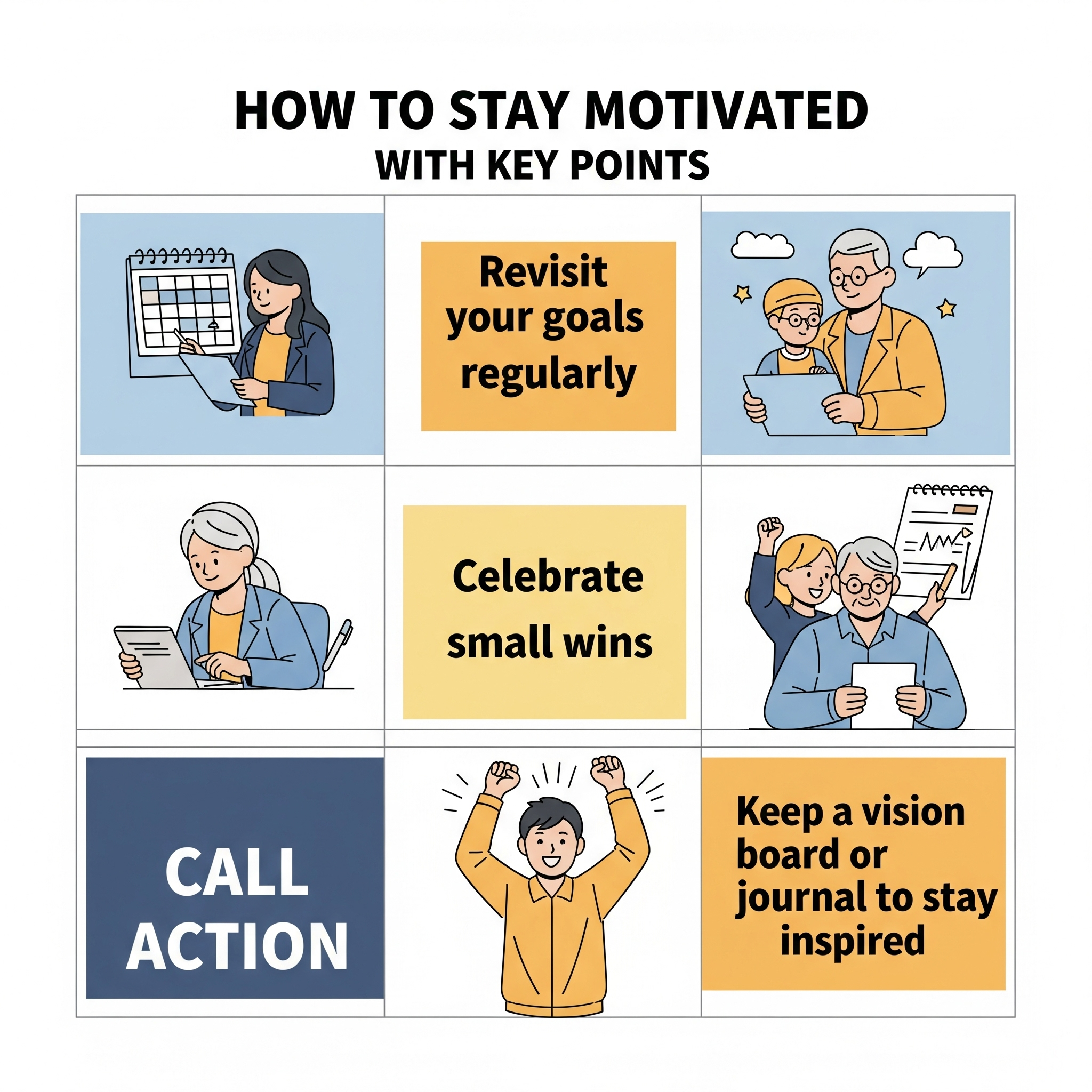
Seeking Help and Support
-
Talk to trusted friends about your worries
-
Join online or in-person support groups
-
Explore apps and resources offering mental health support for overthinkers
Final Thoughts
Overthinking drains your energy, robs you of peace, and holds you back. But it doesn’t have to control your life. With awareness, simple tools, and regular practice, you can quiet the noise and reconnect with clarity, peace, and purpose. Take a breath, take a step, and know – your mind is a powerful tool if you know how to use it.



